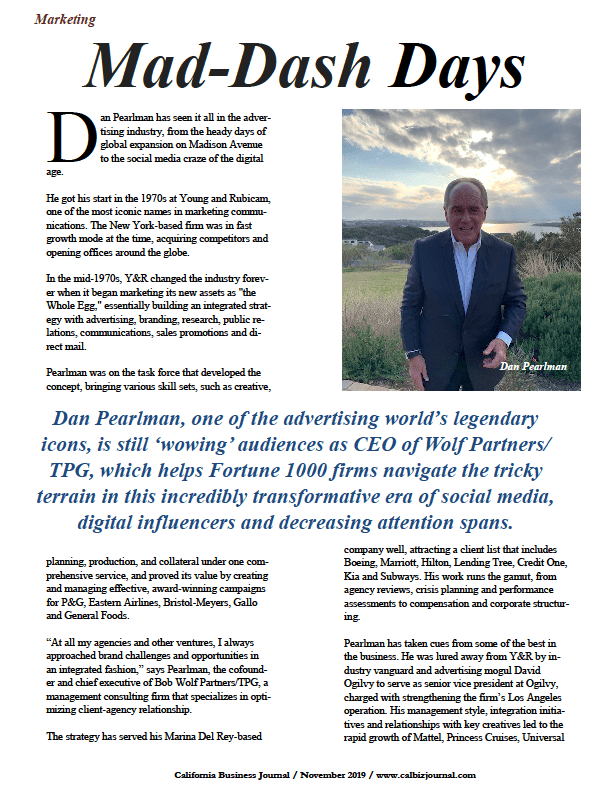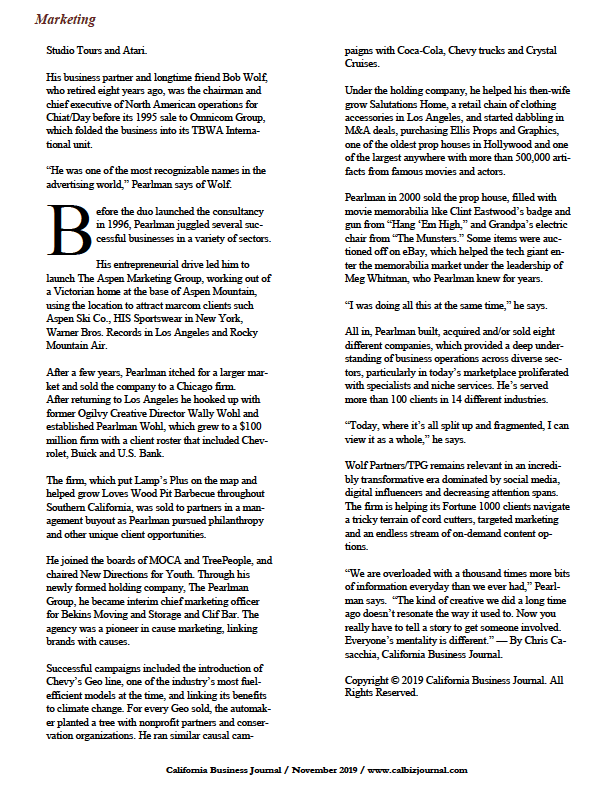(Photo: Dan Pearlman)
Dan Pearlman has seen it all in the advertising industry, from the heady days of global expansion on Madison Avenue to the social media craze of the digital age. After earning his MBA at UCLA, he got his start in the 1970s at Young and Rubicam, one of the most iconic names in marketing communications. The New York-based firm was in fast growth mode at the time, expanding services, acquiring competitors and opening offices around the globe.
In the mid-1970s, Y&R changed the industry forever when it began marketing its new assets as “the Whole Egg,” essentially building an integrated strategy using advertising, branding, research, public relations, sponsorship/event marketing, and sales promotion. Pearlman was on the task force that developed the concept, combining the aforementioned platforms along with skill sets such as engaging creative ideas, design, story-telling, strategic brand positioning, and careful measurement of results into one comprehensive approach. It proved its value by creating and managing effective, award-winning campaigns for P&G, Eastern Airlines (now Delta), Bristol-Meyers, Gallo and General Foods (now Mondelez).
“At all my agencies and other ventures, I always approached brand challenges and opportunities in an integrated fashion,” says Pearlman, the cofounder and chief executive of Bob Wolf Partners/TPG, a management consulting firm that specializes in optimizing client-agency relationship, including conducting agency reviews, performance audits, and structuring/negotiating win-win client-agency compensation. The strategy has served his Marina Del Rey-based company well, attracting a client list that includes Boeing, Marriott, ADT, Hilton, Lending Tree, Credit One, Kia and Subway.
Pearlman has taken cues from some of the best in the business. He was lured away from Y&R by industry vanguard and advertising mogul David Ogilvy to serve as senior vice president at Ogilvy, charged with strengthening the firm’s Los Angeles operation. His management style, integration initiatives and relationships with key creatives led to the rapid growth of Mattel, Princess Cruises, Universal Studio Tours and Atari.
His business partner and longtime friend Bob Wolf, who retired eight years ago, was formerly the chairman and chief executive of the North American operations for Chiat/Day before its 1995 sale to the Omnicom Group.
 “He was one of the most recognizable names in the advertising world,” Pearlman says with a smile, “which is why we put his name first on our letterhead. There was a method to my madness.”
“He was one of the most recognizable names in the advertising world,” Pearlman says with a smile, “which is why we put his name first on our letterhead. There was a method to my madness.”
Before the duo launched the consultancy in 1996, Pearlman juggled several successful businesses in a variety of sectors.
His entrepreneurial drive led him to launch The Aspen Marketing Group, working out of a Victorian home at the base of Aspen Mountain, using the location to attract marcom clients such Aspen Ski Co., HIS Sportswear in New York, Warner Bros. Records in Los Angeles and Rocky Mountain Air out of Denver. After a few years, Pearlman itched for a larger market and sold the company to a Chicago firm.
After returning to Los Angeles, he hooked up with former Ogilvy Creative Director, Wally Wohl, and established Pearlman/Wohl, which grew to $100 million firm with a client roster that included Chevrolet, Buick and U.S. Bank. The firm, which put Lamp’s Plus on the map and helped grow Loves Wood Pit Barbecue throughout Southern California, was sold to partners in a management buyout as Pearlman pursued philanthropy and other unique opportunities. He soon joined the Boards of The Museum of Contemporary Art and TreePeople, and chaired New Directions for Youth. He then became interim chief marketing officer for Bekins Moving and Storage as well as for Clif Bar.
Through a newly formed holding company in 1989, The Pearlman Group, Pearlman executed a new vision. The result was an agency that became a pioneer in “cause marketing”, strategically linking brands with causes where there was an authentic fit. Successful campaigns included the introduction of Chevy’s Geo line, the industry’s most fuel-efficient models at the time, and linking its benefits to climate change. For every Geo sold, the automaker planted a tree with nonprofit partners and conservation organizations. Pearlman ran similar causal campaigns with Coca-Cola (education), Chevy Trucks (National Parks) and Crystal Cruises (cleaner oceans and bays).
Under the holding company, he helped his then-wife grow Salutations Home, a retail chain of clothing accessories in Los Angeles, and started dabbling in M&A deals, purchasing Ellis Props and Graphics, the oldest prop house in Hollywood and one of the largest anywhere with more than 500,000 artifacts from famous movies and actors.
Pearlman, in 2001, sold the prop house, filled with movie memorabilia such as Clint Eastwood’s badge and gun from “Hang ‘Em High,” and Grandpa’s electric chair from “The Munsters.” Some items were auctioned off on eBay, which helped the tech giant enter the memorabilia market under the leadership of Meg Whitman, “who I knew from her Pepsi years.”
“I was on a mad-dash to build various brands of my own and others for clients…doing all this at the same time,” he says. All in, Pearlman built, acquired and/or sold eight different companies, which provided him with a deep understanding of business operations across diverse sectors, particularly in today’s marketplace proliferated with specialists and niche players. He’s been involved with over 100 brands in 14 different industries.
“Today, where the business environment is so cluttered and fragmented, I can view it as a whole,” he says. “As I have pulled back from my “mad-dash” days to focus on consulting, I enjoy and bring clients value through the insights and perspective I bring to the party.”
Bob Wolf Partners/TPG remains relevant in an incredibly transformative era dominated by social media, digital influencers, big data and decreasing attention spans. The firm is helping its Fortune 1000 clients across the U.S. navigate the tricky terrain of cord cutters, targeted marketing and an endless stream of on-demand content options.
“We are overloaded with a thousand times more bits of information everyday than we ever had,” Pearlman says. “The kind of creative we did a long time ago, and methods of delivery, don’t resonate the way they used to. Today, you really have to tell a story to get select audience segments engaged. Everyone’s mentality is different. It’s a mad world out there.”
Copyright © 2019 California Business Journal. All Rights Reserved.






